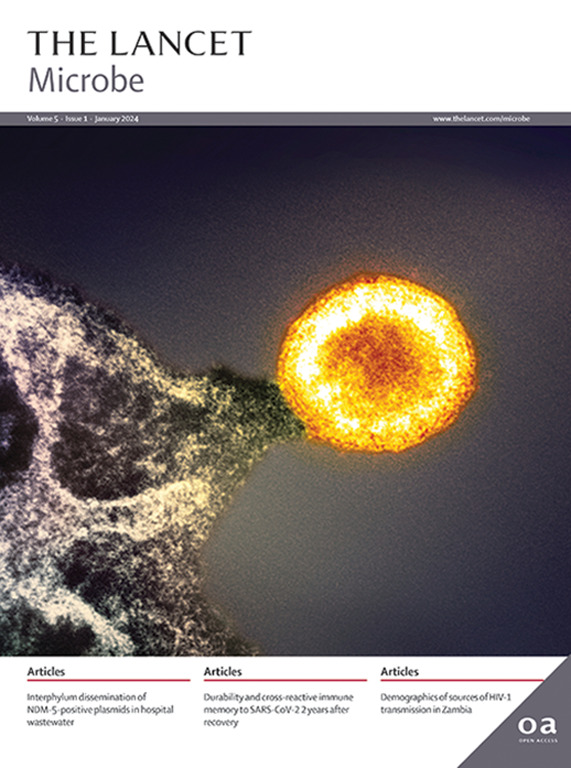乌干达和赞比亚儿童MTB/RIF超结核诊断的无离心粪便处理方法:一项观察性、前瞻性、诊断准确性研究。
IF 20.4
1区 生物学
Q1 INFECTIOUS DISEASES
引用次数: 0
摘要
背景:世卫组织推荐Xpert MTB/RIF Ultra (Ultra)用于儿童结核病诊断的粪便检测。粪便处理需要去除碎片和PCR抑制剂,通常需要使用离心,这可能成为低收入和中等收入国家(LMICs)实施的障碍。我们采用三种无离心机处理方法,即简单一步法(SOS)、粪便处理试剂盒法(SPK)和优化蔗糖浮选法(OSF),对照微生物参考标准(MRS),评估Ultra对粪便的诊断准确性。方法:在这项观察性、前瞻性、多国、诊断准确性研究中,我们收集了乌干达一家医院和赞比亚两家医院15岁以下推定结核病儿童的两份呼吸道样本和两份粪便样本进行超检测和培养(仅对呼吸道样本)。我们将阳性MRS定义为呼吸样本的阳性培养或Ultra,阴性MRS定义为两个呼吸样本的阴性培养或Ultra。我们在所有站点使用自我管理的问卷评估了实验室操作人员对测试易用性的看法。该研究已在ClinicalTrials.gov (NCT04203628)和Pan African ClinicalTrial Registry (PACTR202006814433059)注册。结果:在2020年1月13日至2021年12月31日期间入组的216名儿童中,215名被纳入研究,其中104名(48.4%)为女性,211名(51.6%)为男性,中位年龄为1.8岁(IQR 1.1 ~ 1.8), 68名(31.6%)为HIV阳性,38名(17.7%)为MRS阳性。根据可用性,对于一种或两种粪便样本,粪便Ultra对MRS的敏感性对SOS为69.7% (95% CI 53.1 - 84.4),对SPK为69.7% (95% CI 53.1 - 84.4),对OSF为73.5% (56.5 - 87.1)(McNemar试验p为所有方法0.0.6),所有方法的特异性均在96%以上。7名操作员中有6人认为SOS粪便法是最简单的,因为它需要最少的操作和不需要额外的试剂。结论:无离心粪便处理方法可以提高中低收入国家结核病微生物诊断的可及性。这些结果促使世卫组织认可SOS和OSF方法。资金:国际药品采购机制。本文章由计算机程序翻译,如有差异,请以英文原文为准。
Centrifuge-free stool processing methods for Xpert MTB/RIF Ultra tuberculosis diagnosis in children in Uganda and Zambia: an observational, prospective, diagnostic accuracy study
Background
WHO recommends Xpert MTB/RIF Ultra (Ultra) for stool testing for tuberculosis diagnosis in children. Stool processing requires removal of debris and PCR inhibitors, frequently by using centrifugation, which can be an implementation barrier for low-income and middle-income countries (LMICs). We evaluated the diagnostic accuracy of Ultra on stool using three centrifuge-free processing methods, the simple one-step (SOS), stool processing kit (SPK), and the optimised sucrose flotation (OSF) methods against a microbiological reference standard (MRS).
Methods
In this observational, prospective, multicountry, diagnostic accuracy study, we collected two respiratory samples and two stool samples in children younger than 15 years with presumptive tuberculosis in one hospital in Uganda and two hospitals in Zambia for Ultra testing and culture (on respiratory samples only). We defined positive MRS as positive culture or Ultra on respiratory sample and negative MRS as two negative respiratory samples by either culture or Ultra. We assessed the perception of the laboratory operators of test ease-of-use using a self-administered questionnaire at all sites. This study is registered with ClinicalTrials.gov (NCT04203628) and the Pan African Clinical Trial Registry (PACTR202006814433059).
Findings
Of the 216 children enrolled between Jan 13, 2020, and Dec 31, 2021, 215 were included in the study and of these 104 (48·4%) were female and 211 (51·6%) were male, the median age was 1·8 years (IQR 1·1–4·8), 68 (31·6%) were HIV positive, and 38 (17·7%) were MRS positive. For one or both stool samples, depending on availability, the sensitivity of stool Ultra against MRS was 69·7% (95% CI 51·3–84·4) for SOS, 69·7% (51·3–84·4) for SPK, and 73·5% (55·6–87·1) for OSF (McNemar test p>0·6 for all), with a specificity above 96% for all methods. The SOS stool method was considered the easiest by six of seven operators because it required least manipulation and no additional reagents.
Interpretation
Centrifuge-free stool processing methods could improve access to microbiological diagnosis of tuberculosis in LMICs. These results contributed to the WHO endorsement of the SOS and OSF methods.
Funding
UNITAID.
求助全文
通过发布文献求助,成功后即可免费获取论文全文。
去求助
来源期刊

Lancet Microbe
Multiple-
CiteScore
27.20
自引率
0.80%
发文量
278
审稿时长
6 weeks
期刊介绍:
The Lancet Microbe is a gold open access journal committed to publishing content relevant to clinical microbiologists worldwide, with a focus on studies that advance clinical understanding, challenge the status quo, and advocate change in health policy.
 求助内容:
求助内容: 应助结果提醒方式:
应助结果提醒方式:


